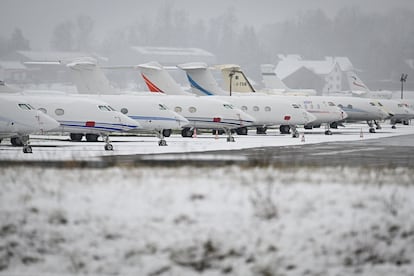Report proposes tax on the ultra-rich to finance a global climate fund
Led by French economists Thomas Piketty and Lucas Chancel, the study advocates a progressive rate of 1.5% to 3% for fortunes of over $100 million


Climate change is also a story of inequality. Inequality between the culprits and the victims of a crisis that not only causes global heating but also triggers extreme weather events that further impoverish those who are already living in poverty. A group of researchers from the World Inequality Lab – a project led by the French economists Lucas Chancel and Thomas Piketty – advocates for the creation of a global climate tax on the planet’s greatest fortunes. These experts say that the 65,130 wealthiest individuals, those with over $100 million (around €92 million), representing 0.001% of the world’s adult population, should pay a progressive tax ranging from 1.5% to 3% of their fortune to help less fortunate people adapt to global warming and protect themselves against this crisis.
The move would raise about $295 billion, according to the Climate Inequality Report 2023, which was also co-authored by the economists Philipp Bothe and Tancrède Voituriez. Adaptation finance provided and mobilized by rich countries to developing nations is estimated at $29 billion, well below the real needs, which amount to $200 billion. The way to close this financing gap is the focus of an important part of international negotiations on climate change. At the last climate summit, held at the end of last year in the Egyptian city of Sharm el Sheikh, the creation of a compensation fund for the poorest countries was agreed on, but it is yet to be determined how this instrument will be funded and to whom it should be directed. Meanwhile, UN Secretary General António Guterres has proposed taxing the windfall profits of energy companies, the main emitters of greenhouse gases. Now, this group of economists has gone a step further, proposing, among other measures, the establishment of a global climate tax on great fortunes.
The French economist Lucas Chancel told EL PAÍS that so far, no similar initiative has been launched anywhere. However, he says, calls for taxes on wealth are emerging all over the world, including at the latest World Economic Forum in Davos a few weeks ago. And he adds: “Some countries have introduced or increased progressive wealth taxes in recent years, for example, Norway or Argentina, and others have explicitly connected the introduction of new progressive taxes [on capital gains] with funding for climate mitigation [this is how the Biden administration presented its progressive tax reforms in the context of the Inflation Reduction Act last the summer].” Furthermore, Chancel continues, “The governments of rich countries have agreed to finance climate adaptation and loss-and-damage in low-income countries, but are still struggling to find new resources to do that.”
The World Inequality Lab’s tax proposal is progressive. For individuals with net assets of $100 million to $1 billion (62,380 people) the tax rate would be 1.5%; for those with assets of $1 billion to $10 billion (2,584 individuals) it would be 2%; for fortunes between $10 billion and $100 billion (155 adults) it would be 2.5%; and for the 11 people with assets above $100 billion it would be 3%.
“Given the very large and rising concentration of wealth among a few top holders at the global level [...] a global wealth tax on the world’s centimillionaires [i.e. individuals owning more than $100 million net], would raise substantial amounts of money, even when the tax rates are relatively low,” adds the study, which is supported by the Norwegian Agency for Development Cooperation and the United Nations Development Programme. “Such tax rates, if they were implemented successfully (even after factoring some capital depreciation and tax evasion) would raise about$300 billion every year.”
The authors are aware that “it is unlikely that a global deal on a tax on extreme wealth to fund climate change adaptation and mitigation will be obtained in the very near future.” However, they argue, “such a measure can be initiated by a subset of countries without the need for consensus” at events such as UN climate summits. “For instance, if the US and European countries were to implement such a tax, they would raise about $175 billion each year [...] Our tax proposal would, for instance, raise $121 billion in the US and $56 billion in Europe.” The reports calls this “a substantial amount of money that could fully or partly be redistributed to a global climate fund, at no cost to 99.99% of the population of these countries.”
Even so, the economists who drafted the proposal stress the importance of other low- and middle-income economies also taxing their own centimillionaires to finance a global climate scheme.
Inequality
The report also addresses the inequality of the climate crisis: “Climate impacts are not equally distributed across the world:on average, low- and middle-income countries suffer greater impacts than the richer counterparts. At the same time, the climate crisis is also marked by significant inequalities within countries,” it says. “All individuals contribute to emissions, but not in the same way. The top 10% of global carbon emitters generate almost half of all greenhouse gas emissions.”
The economists point out that better understanding how groups may win and lose from the energy transition is key to accelerating it. “It is also necessary to draw policy conclusions from the fact that the top emitters are likely to be relatively well protected from the adverse consequences of climate change. Hence, their incentives to reduce emissions are not necessarily aligned with the damage those emissions cause.” This holds at the international level, as well as within countries.
Removal of subsidies
The study also highlights that the climate fight and the battle to end global poverty are not incompatible. “Recent research contradicts the idea that ending global poverty would eat up most of the remaining global carbon budget to meet the Paris targets. Lifting large numbers of people out of poverty need not have a large negative effect on climate change mitigation.”
The report makes some recommendations to governments, such as making the most of relatively easy-to-implement measures like taxes on windfall profits that could “help to fund adaptation and mitigation without hurting low and middle-income groups disproportionately.” Other pending issues include the gradual removal of public subsidies for fossil fuels. The report highlights the positive example of Indonesia, which “suggests that when accompanied by directed social reforms for the population as a whole (e.g. health insurance) and specific assistance to low-income households, potential fuel price hikes do not necessarily result in welfare losses for the poor.”
Sign up for our weekly newsletter to get more English-language news coverage from EL PAÍS USA Edition
Tu suscripción se está usando en otro dispositivo
¿Quieres añadir otro usuario a tu suscripción?
Si continúas leyendo en este dispositivo, no se podrá leer en el otro.
FlechaTu suscripción se está usando en otro dispositivo y solo puedes acceder a EL PAÍS desde un dispositivo a la vez.
Si quieres compartir tu cuenta, cambia tu suscripción a la modalidad Premium, así podrás añadir otro usuario. Cada uno accederá con su propia cuenta de email, lo que os permitirá personalizar vuestra experiencia en EL PAÍS.
¿Tienes una suscripción de empresa? Accede aquí para contratar más cuentas.
En el caso de no saber quién está usando tu cuenta, te recomendamos cambiar tu contraseña aquí.
Si decides continuar compartiendo tu cuenta, este mensaje se mostrará en tu dispositivo y en el de la otra persona que está usando tu cuenta de forma indefinida, afectando a tu experiencia de lectura. Puedes consultar aquí los términos y condiciones de la suscripción digital.








































